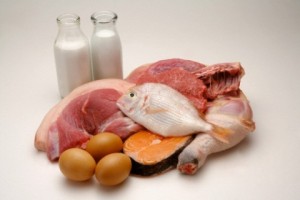I’m sure you have a stereotype in your head about the kind of person who uses protein powder: muscle-bound gym rats shouting “Yeah, bro!” That couldn’t be further from the truth. The reality is that protein powder can be a useful tool in helping every individual achieve good health. In a recent post, I told you about how Americans are consuming a large ratio of carbs compared to fat and protein. You may have even noticed that sometimes fat intake is rather large as well, like in the case of a Big Mac. The macronutrient that is rarely consumed in excess is protein, which is unfortunate considering that protein provides the building blocks for your organs and muscles. Protein powder can be the perfect tool to help balance your protein deficit.

Why Protein Powder?
You may think that because you don’t work out, protein powder isn’t right for you. First of all, I highly encourage you to start working out. But even if you don’t, you can still benefit from protein powder. Even though protein powder can seem costly on a per pound basis, you’re actually paying less per gram of protein. How? Foods like steak are not composed purely of protein, instead having lots of water weight along with other nutrients like fat. Of course those nutrients can be healthful as well, but if you’re aiming to boost your protein consumption then protein powder can give you the most bang for your buck. Here’s a comparison of a few common food items to give you some perspective:
- Whole milk: $3.90/gallon –> $0.03/gram of protein
- Cottage Cheese: $5.89/32 oz –> $0.053/gram of protein
- Steak (London broil): $3.99/lb –> $0.036/gram protein
- Protein powder: $7.52/lb –> $0.012/gram protein
Pretty cheap stuff. At a little over one cent per gram of protein, there is a noticeable difference between protein powder and milk, the next closest contender. You’d also have to drink plenty of milk to get the same quantity of protein compared to the powder.
Convenience is also a huge factor when it comes to selecting your protein source. For me, a bowl of oatmeal with some protein powder in the morning provides a nice, well-rounded breakfast experience with a balanced nutritional profile. Oatmeal on it’s own doesn’t taste great, but with the addition of protein powder I can enjoy cookies and cream or Reese’s peanut butter cups for breakfast. Not too shabby! All it takes is a quick scoop, pour, and stir to make. No cooking (steak) or refrigeration (milk and cottage cheese) required!
What to Choose, What to Choose
If you’ve ever taken a look at the protein powders available in stores, there’s a plethora of ways in which they try to market it. Plenty of graphs and buzzwords abound. The market for protein powder is huge and these manufacturers know it. Stick to the basics. My two favorite brands of protein powder are Body Fortress and Muscle Milk
.

I like Body Fortress for its simplicity and price point. Body Fortress costs about $15 for a 2 pound tub and comes in 5 flavors (it’s the one I cited above in the price comparison). In my experience, the powder mixes well and the flavors are pretty well-done. The flavors are:
- Vanilla
- Chocolate
- Strawberry
- Cookies n’ Cream
- Chocolate Peanut Butter (honestly tastes more like peanut butter without chocolate)
In oatmeal, the powder dissolves completely and easily with stirring. If you ask me, the protein powder beats the Quaker Oat flavor packets and is far more nutritious. I also like that Body Fortress already has creatine mixed in. Creatine is one of the most studied supplements out there and is associated with greater mental focus, muscular volume, and reduced risk of depression (here’s a great not-too-sciency resource on creatine). In case you’re concerned about its safety, it is found naturally in steak so you’re probably consuming some already. The one major side effect that is reported is dehydration, so be sure to drink plenty of water if you take Body Fortress. Muscle Milk is also an excellent protein powder, sold at a higher price. The flavor selection is much wider, with some very specific ones like Graham Cracker and Raspberry Cheesecake. Unlike Body Fortress, Muscle Milk does not have creatine, so if you prefer to avoid it then I recommend Muscle Milk instead.

Considering the protein deficit that plagues many Americans, protein powder is a viable solution to compensate. Keep in mind that it should only be used as a supplement, and that eating natural foods like steak, eggs, nuts, and vegetables is still necessary to maintain overall Wellness. Think of protein powder as your cheap, easy answer to a busy lifestyle with high demands and very little allowance to prepare a full, protein-packed meal.
Images:
2 thoughts on “Why You Need Protein Powder”